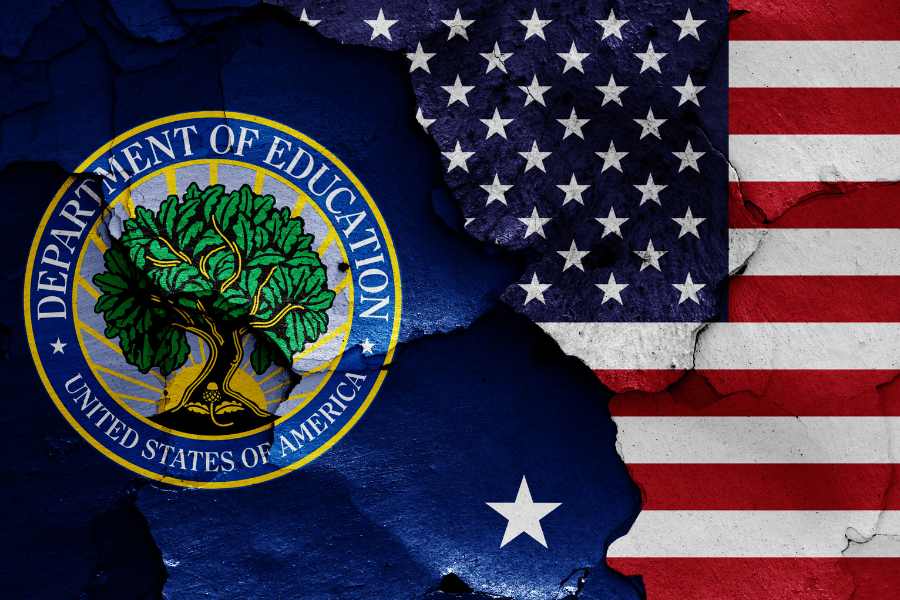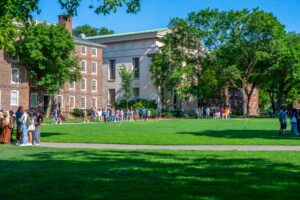The Department of Education (DOE) has been in the news a fair amount recently, as there are apparently plans underway to do away with it. This, of course, raises questions for many of the students and parents we work with. Namely, what does the Department of Education actually do, and how will its removal impact me, and my education?
In this article, we’re going to answer these questions for both high school and college. We’re going to look at what the Department of Education does for schools and students, and what potential ramifications of its removal may be. We will look at the impacts on high schools and colleges separately, as the department has influence over both.
What the Department of Education does for High Schools
There are a lot of different things that the Department of Education does (and doesn’t) do, so we’ll look at the most important ones in turn. We will note that these mostly only apply to public schools; we will note specifically where they apply to private schools as well.
Funding
As always, the most noticeable impact of any program is money. Schools districts receive on average 10% of their total funding from the federal government, and this is administered and distributed by the Department of Education. Most of this funding goes to Title I schools, or to support disability programs; thus these funds are not evenly distributed.
Title I refers to legislation passed by Lyndon Johnson in the 1960s; this act set up most of the basis for the federal government’s involvement in education. The goal of this portion is to provide additional funding to schools with a high percentage of students from low-income backgrounds.
This funding may still be authorized if the Department of Education is done away with, but this is uncertain. Schools in the suburbs will be least impacted, while those in urban and rural areas may lose a greater share of funding proportionally. Losing this funding will have a negative impact on education, as many school districts already face budget shortfalls.
Curriculums
The DOE does not set curricular standards for public schools; this is done at the state and local level. What they do enforce is mandated testing; the standards students must meet are set by the states, but the DOE requires testing be done. This was first implemented by the No Child Left Behind act, but this was altered by the Every Student Succeeds act.
In general, the federal government has no mechanism to enforce curricular changes through the DOE; this is left to the states and local school boards. Any removal of the DOE does not end the testing mandate, as this was signed into law by Congress, but it does end any enforcement mechanism. Whether or not an end to standardized testing is ideal is uncertain, but we don’t expect sweeping curriculum changes because of this; any of those will come at the state level.
Students with Disabilities
Students with disabilities have a right to an education. This is protected and funded by the DOE. This takes the form of 504 plans and IEPs; we discuss how these work in practice in this article. The end of the DOE will impact these students in two ways. First, as we already mentioned, is funding. Students with disabilities often require additional support or resources, and these cost money. This comes in large part from the DOE; while it is authorized by Congress, the DOE handles distribution.
The other point of influence is enforcement. A law doesn’t really count if nobody makes sure it’s being followed; otherwise it’s just a suggestion. The DOE is in charge of investigating complaints of violations of disability protections in education, and mandating punishments should they be needed. It’s important to note that this can also impact private school students. While private schools may set many of their own standards, they must still abide by the Americans with Disabilities Act, which many of these protections are based in.
These laws don’t go away if the DOE does, but the question of who manages funding and enforcement is entirely open. This could be a major issue for students with disabilities. While we believe that schools want to help all students, they may not have the resources or support they themselves need in order to do so without the backing of the DOE. Some districts facing budget cuts may also have no choice but to cut back on these services.
What the Department of Education does for Colleges
The Department of Education has even less of a direct influence on colleges than it does on high schools. Certainly it has no way to impact curriculums or admissions decisions. That said, it does still have influence, and we’ll now look at what the DOE does in relation to higher education.
FAFSA and Student Loans
The Free Application for Federal Student Aid (FAFSA) is, as the name implies, administered by the federal government. This is true of both the direct aid for students in the form of Pell grants, and the indirect aid in the form of subsidized and unsubsidized student loans.
There has been a significant debate over the place of student loans in the college education space, but it is certain that a significant number of students could not afford education without these loans. Further, without these students paying tuition using loans, many colleges themselves would face significant budget shortfalls. The colleges with the largest budgets can exist indefinitely off of their investment income, but this only applies to a small number of colleges. Most schools require tuition dollars to keep the lights on.
Existing student loans are also administered by government policies, though the actual servicing of the loans has been turned over to third party firms. While there is an ongoing debate over the possibility of debt relief, the DOE is still in charge of setting interest rates and terms of repayment for student loans.
An end to the DOE raises several important questions here, namely as to whether or not this funding will still be available to students, and who will administer it. The struggle with the FAFSA update this year demonstrates how stressful any hiccups with this system can be for students; any alterations here, even if the funding is maintained, will likely create many headaches for students and parents. If the funding is cut off entirely, then many students will need to find alternate sources for funding for college, and may need to take out third party loans.
Title IX Protections
First passed in the 1970s, Title IX serves to address issues of sex discrimination in education. The Department of Education has the mandate to interpret and enforce these laws, and in so doing impacts college experiences in myriad large and small ways.
The most visible impact is in collegiate sports. Colleges are required to have equivalent scholarship offers and spending on men’s and women’s athletics. WHile they usually fall somewhat short of equivalent facilities, they do offer equivalent funding for scholarships and recruiting. This has had multiple unanticipated effects, including the long-term dominance of the US Women’s national team in soccer tournaments.
The protections also extend to sexual harassment on campus. The case Alexander v Yale established that incidents of sexual harassment count as illegal sexual discrimination, and a barrier to equality in education. The DOE is given the mandate to enforce this by potentially cutting off funding to universities who do not address incidents of sexual harassment or discrimination on their campuses.
The DOE can further investigate and assess fines on colleges who do not adequately address reports of sexual assault on their campuses. They mandate options for reporting, and define what behaviors constitute assault. This is all done by departmental mandate, and can and has been changed by different administrations.
The Title IX protections still theoretically exist without the DOE, but this leads again to the question of enforcement. Without the DOE to lead investigations or file suit against colleges which do not obey the regulations, then there may as well not be regulations in the first place. These duties could theoretically be given to another government agency, but the impact on college education will be significant.
Accreditation
How do you know that a college provides a valuable education, rather than merely an incredibly expensive piece of paper? Accreditation. This is the process of certification which ensures that an education offered by a college does what it is supposed to, and that students receive the value they are supposedly paying for.
The DOE itself does not accredit colleges; this is done by a series of third party bodies. These bodies are national and regional; there used to be a distinction, but the DOE recently made them equivalent in terms of how their accreditation is handled. Colleges are generally able to self-regulate in terms of what counts for accreditation, but the DOE is able to set general policies.
We saw the results of their ability to regulate accreditation recently with the crack-down on for-profit colleges. These schools, according to the DOE, were making unsubstantiated claims about how well they were preparing students for the job market after graduation, and the salaries students were earning were not commensurate with those of alumni from not-for-profit institutions.
This impacted a large number of students, both those who were considering attending these schools, and those who already had; the DOE used this move to also begin forgiving debt that students took out to attend these schools.
There is still a need for accreditation without the DOE, but it is uncertain how it would be handled. It could either be taken over by another governmental department, or outsourced fully to a third party group. This could lead to competing standards for accreditation, depending on how well universities are able to collaborate with each other.
Final Thoughts
The Department of Education contributes both a fair amount and not much at all to the educational process of American students. We hope this article has shown you the various concerns it oversees, and how it impacts the various levels of education in the US.
Of course, the way something has been is not always a good guarantee for the future, especially as political winds change. If you want to be updated for the future of education, then our newsletter is a great source of information on the constantly changing course of college education. Schedule a free consultation today to learn more about how our expertise can help you.








